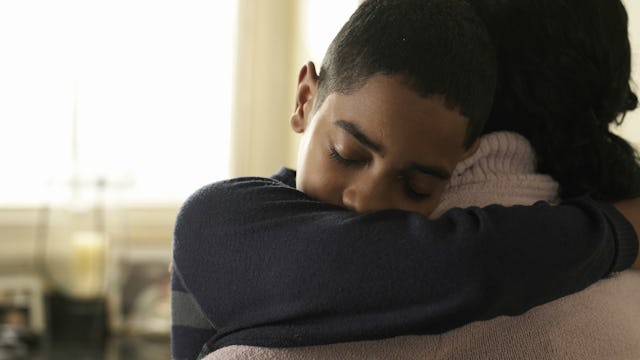We’ve Got To Start Addressing The Emotional Needs Of Our Boys

It is no secret that we adults are doing our boys a great disservice in terms of emotional support. For so long, society has told boys that they have to be “tough” and “strong,” and that showing emotions is “weak” and “feminine.” This often results in them not knowing how to express emotions like sadness and displeasure because they have been taught to suppress those emotions. And we all know that bottling up our emotions is never a good thing.
Research shows that boys actually need more emotional support than girls, but because of societal expectations, and gender stereotypes, we are not giving it to them. There are biological differences between the ways boys’ and girls’ brains develop. In fact, boys are more emotionally vulnerable while still in utero.
But, for some reason, we’re not talking enough about those differences, even though they’re the roadmap for the kind of emotional support we should be giving our boys. Because it is becoming increasingly more clear that if we don’t, we will continue to be putting our boys in danger.
According to a study by Sebastian Kraemer, “The Fragile Male,” which was published in 2000, males are at a disadvantage from conception, long before social constructs even have a chance to come into play. According to his study, male embryos are more vulnerable to maternal stress, and male fetuses are more susceptible to things like cerebral palsy. Males are more likely to be born prematurely, with stillbirths being more common.
After birth, they are far more likely to exhibit high cortisol (the stress hormone) levels from neonatal assessments. They are also more vulnerable to birth trauma and unresponsive caregiving, which could leave them in distress. And at birth, their brains are less developed than girls by up to six weeks. Boys continue to develop at a slower pace than girls do, even as they get older. Kraemer notes, “The care of boys is generally more difficult and, therefore, more likely to go wrong, adding to the deficits already existing before birth.”
Boys sometimes seem like feral creatures — they’re loud, rambunctious, constantly moving — and it can be exhausting, even in those early months. But in his paper, “All Our Sons: The Developmental Neurobiology And Neuroendocrinology Of Boys At Risk,” Dr. Allan Schore of the UCLA David Geffen School of Medicine, points out the importance of infant boys forming positive relationships with their parents and/or caregiver on their development and emotional strength.
“In light of the male infant’s slower brain maturation, the secure mother’s attachment-regulating function as a sensitively responsive, interactive affect regulator of his immature right brain in the first year is essential to optimal male socioemotional development,” he says. In other words, it’s imperative to spend time bonding with your baby, giving them cuddles as much as you can, and making sure that you’re there for them when they need you.
“Young boys are taught early that expressing their emotions is taboo. This causes long-term harm to their relationships with each other and with people of other genders,” says Jessica Raven, the executive director for the Collective Action for Safe Spaces said in an interview with HuffPost Canada. Subscribing to these archaic beliefs about how a boy is supposed to handle his feelings is what leads to them not having a proper outlet for them.
This is one of the many ways in which the patriarchy does a disservice to men too, but they have been conditioned to believe that it’s normal. Emotions are a human thing, not a gender thing. As the parent to a boy, it’s easy to fall into those gender traps, like “big boys don’t cry.”
But the only way we’re going to get past them is for us as parents to actively change the conversation. My son cries pretty easily, and it can definitely be trying, but I also know that it’s important to give him the space to have those feelings. Get down on their level, emotionally and physically. When my son cries, I’ll kneel down so I’m looking him in the eye and say something like, “I understand that you’re upset, how can I help?” Then do it. Getting them to take a few calming breaths helps, and sometimes, you just have to let them cry.
By not acknowledging that boys have feelings, and knowing how to give them the proper avenues to explore those complex emotions that make them human, we are only setting them up to keep repeating a damning cycle of toxic masculinity and oppression. By now, there’s enough scientific evidence (not to mention common sense) to tell us that these things are very real, and very important to raising healthy, well-rounded boys. If you love your son, stop trying to make him a tough guy, and give him the space to be a fully formed, emotionally secure person.
This article was originally published on